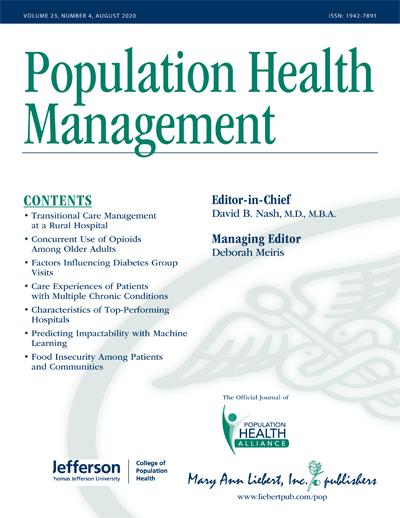
Credit: Mary Ann Liebert, Inc., publishers
New Rochelle, NY, August 25, 2020–Those over age 65 who self-reported as socially isolated were more likely to have a future hospital admission or emergency room visit. The study is published in the peer-reviewed journal Population Health Management. Click here to read the article now.
“These results are novel for 2 reasons,” states David Mosen, PhD, MPH, Kaiser Permanente Center for Health Research, and coauthors. “It is the first study to find that social isolation was predictive of future hospital admission and ED utilization among a population of Medicare Advantage members ages 65 and older. Second, the relationship between social isolation and utilization remained significant, even after adjusting for a comprehensive set of demographic and clinical measures.”
“The work of Mosen and colleagues, from one of the most respected health plans in the nation, confirms what was always a hunch –that lonely older folks end up utilizing more health care resources, of all types, as their social situation worsens. So, let’s go upstream to shut off the faucet–provide them with support services–instead of mopping up the floor with more unnecessary emergency room visits and the like. We now have the data to prove just how important this strategy is!” says David Nash, MD, MBA, Editor-in-Chief of Population Health Management and Founding Dean Emeritus and Dr. Raymond C. and Doris N. Grandon Professor, Jefferson College of Population Health, Philadelphia, PA.
###
About the Journal
Population Health Management is an authoritative peer-reviewed journal published bimonthly in print and online that reflects the expanding scope of health care management and quality. The Journal delivers a comprehensive, integrated approach to the field of population health and provides information designed to improve the systems and policies that affect health care quality, access, and outcomes. Comprised of peer-reviewed original research papers, clinical research, and case studies, the content encompasses a broad range of chronic diseases (such as cardiovascular disease, cancer, chronic pain, diabetes, depression, and obesity) in addition to focusing on various aspects of prevention and wellness. Tables of Contents and a sample issue may be viewed on the Population Health Management website. Population Health Management is the official journal of the Population Health Alliance.
About the Publisher
Mary Ann Liebert, Inc., publishers is known for establishing authoritative peer-reviewed journals in many promising areas of science and biomedical research. A complete list of the firm’s 90 journals, books, and newsmagazines is available on the Mary Ann Liebert, Inc., publishers website.
Media Contact
Kathryn Ryan
[email protected]
Original Source
https:/
Related Journal Article
http://dx.




